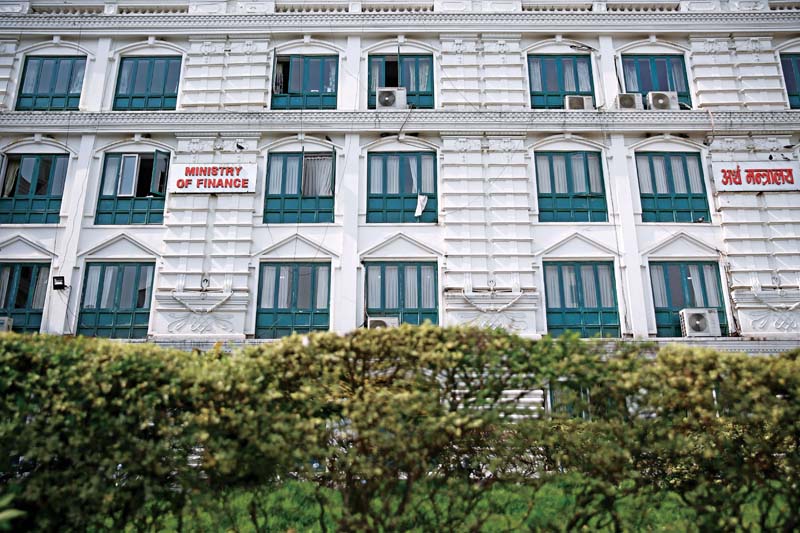Former finance ministers slam govt for ‘fiscal imprudence’
Kathmandu, January 25
As political parties have started competing in announcing distributive programmes to woo voters without any strong sources to run such programmes, former finance ministers and economists have expressed anxiety on the fiscal anarchy and see chances of the country going bankrupt.
Following the decision made by Prime Minister Sher Bahadur Deuba-led Cabinet on Wednesday and today, former finance ministers have said that the country cannot sustain the long-term liability created by the programmes brought by the government like livelihood allowance for people battling with paralysis, diabetes and renal diseases, among others, and also bringing down the eligibility age for social security allowance to senior citizens from 70 years to 65 years, which have created an annual liability of around Rs 20 billion.
Following the electoral debacle in the parliamentary and provincial polls, Deuba-led government, which is in a caretaker role at present, has been creating liability on the state by bringing distributive programmes directly through the Cabinet.
“Even the ministries are not aware about the proposals discussed in the Cabinet and they are all based on direct proposals of the ministers,” according to high-ranking officials of the concerned ministries.
The Cabinet meetings are coming up with decisions to distribute funds from the state coffers almost every day. For instance, today too the government decided to announce 46 persons — 38 victims of Badarmude mishap and eight persons of Kaski killed during the Maoist insurgency — as martyrs. Their families will be given Rs one million each.
And such decisions of the Cabinet are being executed promptly. Prime Minister Deuba today distributed the livelihood allowance from the National Trauma Centre in the Capital.
Former finance minister and leader of Nepali Congress, Ram Sharan Mahat, who has always fought against fiscal imprudence and distributive/populist piecemeal programmes, said that distributing resources without having any strong income source will leave us nowhere and the country will have to suffer in the long run and the people/businesses will have to bear the brunt.
“The country will lose the trust of development partners if it fails to maintain fiscal prudence,” he said. Even within the party, Mahat has always been against distributive programmes and said that he had advised the prime minister to target only the low-income groups when he was consulted on the livelihood allowance programme. “I have advocated for fiscal discipline as I am aware that fiscal anarchy will be costly for the nation, but the senior political leaders have introduced distributive/populist programmes to woo voters,” Mahat told The Himalayan Times.
On Wednesday, the Cabinet decided to provide additional Rs 100,000 on top of Rs 300,000 being distributed to the earthquake victims. This will create a liability of Rs 80 billion in the post-earthquake housing reconstruction grant.
However, PM Deuba is not the only guilty party in redistributing tax money through populist programmes. Earlier, CPN-Maoist Centre Chairman Pushpa Kamal Dahal-led government had added Rs 100,000 for earthquake victims to rebuild houses. Likewise, CPN-UML Chairman KP Sharma Oli has announced that the social security allowance for senior citizens would be raised to Rs 5,000 per month and the allowance will also be provided to the marginalised, disabled and single women when the Left alliance comes to power.
Former finance minister Surendra Pandey opined that the programmes that are not incorporated in policy/programmes of the government and budget cannot be executed through the Cabinet-level decision. Citing that the Deuba-led government is only a caretaker government after the new electoral mandate after the election, Pandey said the government has been misusing the taxpayers’ money without the consent of the Parliament.
The concept of social security allowance was launched by the CPN-UML-led government some two decades back, when the life expectancy of citizens was below 70 and there was no option to bring the people under a social security net like insurance schemes and others. Later, successive governments started raising the amount to attract voters instead of rethinking about diverting it towards insurance or other viable options.
Political parties have used it as an attractive tool, according to Yubraj Khatiwada, former vice chairman of National Planning Commission. “It is imperative
for a socialist country to grow and become prosperous to distribute whatever it can generate from productive forces. If the country doesn’t have much production, then it should not exert pressure on the state coffer through distributive programmes. Otherwise, the country will go bankrupt.”






